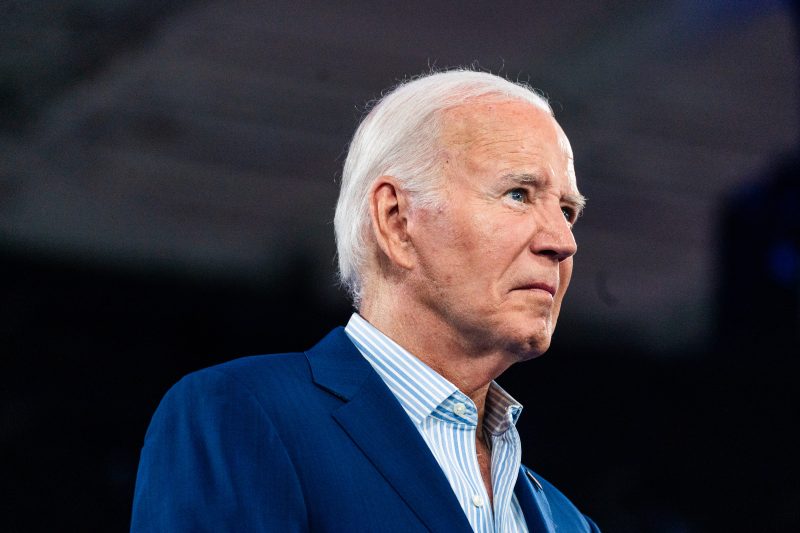Democrats were panicking. Donors were despondent. And some elected officials were privately wondering whether their leader should step aside.
But in President Biden’s cosseted bubble over the past five days, his 90-minute debate stage meltdown Thursday night against former president Donald Trump was merely a “bad night,” with aides quickly retreating to what they hoped was a fail-safe mantra: But Trump is worse!
Campaign officials touted their record fundraising on debate day. White House officials promised that Biden would bounce back at his upcoming North Carolina rally. And Jen O’Malley Dillon, the campaign chair, told nervous donors at the Ritz-Carlton in Atlanta on Friday that “nothing fundamentally changed in the race.”
By Tuesday, however, the business-as-usual calm the Biden team sought to impose had backfired, with some Democrats complaining of being gaslit.
Rep. Lloyd Doggett (D-Tex.) became the first Democratic member of Congress to defect, calling for Biden to drop out of the race, and other Democrats publicly urged Biden to more seriously address his fitness for the job. Rep. James E. Clyburn (D-S.C.) opened the door to a post-Biden election, saying on MSNBC that he would support Vice President Harris were Biden to step aside.
The public developments represented a striking contrast from the four days after Biden’s halting 2024 debate debut, when his inner circle and campaign team publicly emitted a steady stream of denialism and don’t-believe-your-lying-eyes happy talk, arguing that the 81-year-old president — noticeably slower and physically aged than four years ago — is still the best candidate to defeat Trump in November.
“Joe isn’t just the right person for the job,” first lady Jill Biden said at a fundraiser Saturday in East Hampton, N.Y. “He’s the only person for the job.”
Officials said his post-debate swing re-energized donors and voters, pointing to his $38 million fundraising haul in the days after and his packed rally in Raleigh, N.C. They also noted Biden’s top aides made a flurry of private calls to top elected Democrats and donors, to stave off defections and reiterate that Biden had no plans to exit the race.
“We’ve always said this was going to be a close race and a tough campaign, and we’re working incredibly hard to earn every single vote, and taking nothing for granted,” Lauren Hitt, a spokeswoman for the campaign, said in a statement.
But during the four-state swing after the debate — during which he inaugurated a visitor center at the Stonewall National Monument and attended three fundraisers — Biden’s traveling entourage operated with a breezy, nothing-to-see-here attitude, as if pantomiming a thriving campaign not in the midst of an existential crisis.
A top aide to the first lady danced as Diana Ross blared on the tarmac in Raleigh in the wee hours of Friday. Mike Donilon, a longtime confidant to the president and chief strategist of his campaign, eschewed a suit for casual summer wear: a seersucker short-sleeve, button-down shirt and suede horsebit loafers. And aides scoffed at reporters when they asked the president whether he planned to drop out.
Two of Biden’s granddaughters joined him for the final day of the swing, before they reunited with the rest of the Biden clan ahead of a scheduled family photo shoot with Annie Leibovitz at Camp David — a tableau that, as party leaders privately fretted about a second Trump term ushering in the end of American democracy, had echoes of Nero fiddling while Rome burned.
But as Democratic strategists, elected officials and liberal pundits publicly and privately called for — at the very least — a serious discussion about whether Biden should step aside, he and his campaign instead offered business-as-usual spin.
“It’s a familiar story: Following Thursday night’s debate, the Beltway class is counting Joe Biden out,” Dillon wrote in an email blasted out Saturday evening. “The data in the battleground states, though, tells a different story.”
But a sentence about polling later in Dillon’s memo belied her studied nonchalance, seeming to acknowledge that Biden might very well drop in the polls as voters continue to process Biden’s debate stage performance: “If we do see changes in polling in the coming weeks, it will not be the first time that overblown media narratives have driven temporary dips in the polls,” she wrote.
Shortly after Dillon’s memo, deputy campaign manager Rob Flaherty also sent out an email full of “helpful” responses to help calm nervous Democrats.
“If you’re like me, you’re getting lots of texts or calls from folks about the state of the race after Thursday. Maybe it was your panicked aunt, your MAGA uncle, or some self-important Podcasters,” Flaherty wrote, before offering such suggested talking points as “the long-term impact of debates is overstated anyway” and “90 minutes does not negate 3-½ years of results.”
The Biden operation appears to think it has no choice but to proceed as if his meandering debate performance — his voice was frail, his thoughts were garbled, and he failed to meaningfully fact-check Trump — was merely an aberration.
To even entertain the criticism ricocheting around their party would be to tacitly acknowledge what many Democratic voters have long feared and what some officials and strategists have long whispered: that Biden is too old to run for a second term, and that he should have kept his promise to serve as a “bridge” to the next generation and bowed out in time for a vigorous Democratic primary.
Now, however, Biden’s team finds itself taking what Democratic critics point to as hubris and selfishness and repackaging it as resilience.
Inside Biden’s inner circle, the latest round of criticism — particularly from editorial boards and pundits — is being dismissed as the standard underestimation of Biden’s ability. Aides have been quick to remind anxious allies and donors of when Democrats said Biden needed to drop out of the Democratic primary in 2020 after losing badly in Iowa and New Hampshire before going on to win the nomination and defeat Trump. And they have also noted that Biden, who has suffered great personal tragedy, has weathered much tougher times and will bounce back.
As evidence, they pointed to his boisterous rally in Raleigh the day after the debate — where an adoring crowd of more than 2,000 people cheered for him and Biden delivered a fierce defense of his ability to serve as president.
“I don’t speak as smoothly as I used to. I don’t debate as well as I used to. But I know what I do know: I know how to tell the truth,” Biden said. “I know right from wrong. And I know how to do this job. I know how to get things done.”
The Biden campaign is also trying to stay focused on their original theory of the case — that this election needs to be a referendum on the former president, not the sitting one.
During the debate itself, for instance, almost three-quarters of Biden’s social media posts mentioned Trump, while other left-wing political influencers posted more frequently about how old Biden appeared and critiqued his performance, according to a Washington Post analysis of social media posts, podcasts and other public statements.
In the days after the debate, the trend continued. More than half of Biden’s social media posts about the debate focused on Trump and his performance, while only a few addressed Biden’s own age.
The Biden strategy of happy talk, however, comes with risks, making the president and his team seem out of touch with reality.
Hilary Rosen, a longtime Democratic strategist, said she thinks the Biden operation “would have been better off sticking with honesty.”
“You can’t tell people they didn’t see what they saw,” Rosen said. “To try to turn this around and try to make it be everybody else’s fault — it’s not only offensive, it just isn’t going to fly.”








